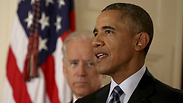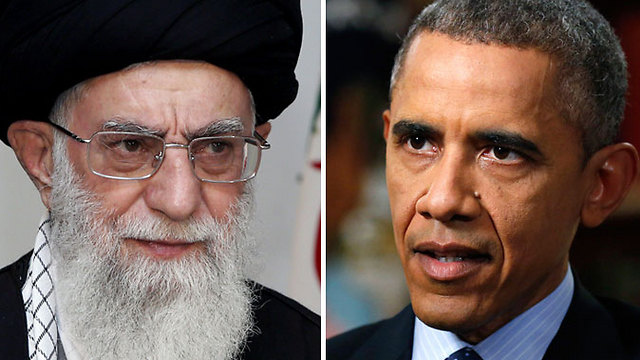
The agreement of the brave
Op-ed: Obama proved that creative diplomacy can win, that it's possible to reach a groundbreaking deal which can change the course of history without bunker-busting bombs and without the wisdom of cruise missiles.
US President Theodore Roosevelt said about the art of managing foreign relations, "Speak softly, and carry a big stick." That's what President Barack Obama did vis-à-vis Iran. In one hand, aggravated choking sanctions; and in the other hand, a long-awaited admission ticket into the family of nations.
Obama did not deviate from the outline he set for himself since taking office. He promised to talk to tyrants if it would be in America's best interest. He promised to pursue agreements if it would turn the world into a better place. That's why he was elected.
He presented the characteristics of a global reconciliation. He mainly presented a policy which was the opposite of the policy of his predecessor, George W. Bush, who acted like the world's sheriff and launched an unjustified war in Iraq, which has since become the land of ISIS.

Obama also brought a different approach. He opened the clenched fist and extended a broad hand. He was both generous and cruel towards Iran. The most serious sanctions were imposed by his administration, and the biggest promises to the Iranian regime were given during his era.
Obama's approach sparked plenty of criticism from the Israeli right and from its branches in the United States. He was accused of deciding to "contain" the Iranian nuclear program, of accepting the bomb from Bushehr, of adopting a weak policy, of having a soft personality and speaking like a naïve professor rather than like a determined leader.
On Tuesday, Obama was able to wave the flag of change and hope once again: He accomplished his mission. The barrier he has placed in front of the Iranian nuclear program is made of concrete. The agreement isn't perfect, but it contains a great promise of calm. He has also vowed to use his veto power against any opposition in the US Congress.
During the exhausting negotiations, Obama ignored the background noises coming from Jerusalem, Capitol Hill and the royal palace in Riyadh. He focused on signs. He received strong indications that the masses in Iran are hoping for the end of the ostracism era more than they are hoping for a nuclear weapon.
And that will be the next stage: The US is already planning student exchange agreements with Iran, tourism, new deals, partnerships in areas of culture and knowledge.
Different winds began blowing between Washington and Tehran on Tuesday. Not like the storm raging in the Obama-Netanyahu relationship, a storm which is blowing the most important component in Israel's national security – its relationship with America – in every direction.
The horse of history kicked off Tuesday, and instead of joining the journey, Israel will pay the price through its isolation. Even when Obama goes home, it's uncertain that a Republican president will be elected to replace him, as Netanyahu hopes. And even if a Republican president is elected, the agreement with Iran is almost an established fact. The agreement of the brave.










